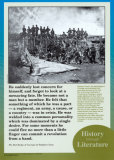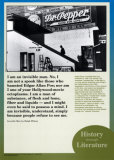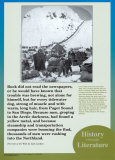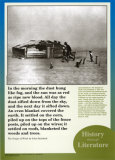|
|
History Through Literature Educational Posters
|
social studies > history > HISTORY THROUGH LITERATURE < language arts & literature posters
|
|
The “History Through Literature” posters for the social studies, history and language arts classrooms and home schoolers. Authors and works include My Antonia (Cather), The Red Badge of Courage (Crane), The Invisible Man (Ellison), The Great Gatsby (Fitzgerald), Incidents in the Life of a Slave Girl (Jacobs), The Call of the Wild (London), All Quiet on the Western Front (Remarque), and The Grapes of Wrath (Steinbeck).
|
|
My Antonia -
Willa Cather
b. 12-7-1873; Virginia
d. 4-24-1947
Poster Text: Willa Cather's My Antonia is about ... life on the Great Plains in the late 1800s. The family struggles ... about the difficulties of being pioneers in the untamed land learning a differnt language and culture in a ... country. This 1886 photograph shows a Nebraska family in front of its sod house, typical of the dwelling found on the Great Plains of the time.
Quote Appearing on This Print: “Cautiously I slipped from under the buffalo hide, got up on my knees and peered over the side of the wagon. There seemed to be nothing to see; no fences, no creeks or trees, no hills or fields, If there was a road, I could not make it out in the faint starlight. There was nothing but land: not a country at all, but the material out of which countries are made.”
• Willa Cather posters
|
|
|
|
The Red Badge of Courage
Stephen Crane
b. 11-1-1871; NJ
d. 6-5-1900; Germany- tuberculosis
Poster Text: Stephen Crane's The Red Badge of Courage was published thirty years after the end of the Civil War, but Crane's portrayal of Private Henry Flemings, a young soldier fighting with New York's 304th Regiment, has become one the most memorable pieces of literature about that war. The Red Badge of Courage ... Fleming's inner struggle with ... and his doubts that he can be a soldier in a war where bravery and honor are as important as winning. This photograph was taken during the Civil War and shows the men of Company C of the 41st New York Infantry.
Quote Appearing on This Print: “He suddenly lost concern for himself, and forgot to look at a menacing fate. He became not a man but a member. He felt that something of which he was a part – a regiment, an army, a cause, or a country – was in crisis. He was welded into a common personality which was dominated by a single desire. For some moments he could flee no more than a little finger can commit a revolution from a hand.”
• Stephen Crane posters
|
|
|
|
Invisible Man
Ralph Ellison
b. 3-3-1914; Oklahoma City, OK
d. 4-16-1994
Poster Text: Ralph Ellison's Invisible Man was published in 1952. ... In the 1930s segregation was the law in many places in this .... kept many African Americans from opportunities that were available to whites. Throughout the novel, others ... the “Invisible Man” based on the sterotypes of African Americans. In the end, the narrator objects to ... expectation of other people – black or white – and ... his individuality. The photograph here shows an African American man entering a movie theatre through the “colored” entrance.
Quote Appearing on This Print: “I am an invisible man. No, I am not a spook like those who haunted Edgar Allan Poe; nor am I one of your Hollywood-movie ectoplasms, I am a man of substance, of flesh and bone, fiber and liquids – and I might even be said to possess a mind. I am invisible, unerstand, simply because people refure to see me.”
• Ralph Ellison posters
• Cultural Contexts for Ralph Ellison's Invisible Man
• more Black History posters
|
|
|
|
Incidents in the Life of a Slave Girl -
Harriet Jacobs
b. 1813; Edenton, NC
d. 3-7-1897; Washington, DC
Incidents in the Life of A Slave Girl, a book by former slave Harriet Jacobs, was published in 1861. It was the first slave narrative written by a black woman.
Jacobs was born and grew up a slave. She was abused repeatedly by her owners, and she spent seven years hidden in an attic to escape him. Later, she fled to be with her children and lived as a runaway slave. She was eventually bought by a woman who gave Harriet her freedom.
Quote:
“The bill of sale!? Those words struck me like a blow. So I was sold at last! A human being sold in the free city of New York!... I well know the value of that bit of paper, but much as I love freedom, I do not like to look upon it. I am deeply grateful to the generous friend who procured it, but I despise the miscreant who demanded payment for what never rightfully belonged to him or his.” The quote refers to Cornelia Willis, her employer and friend, buying her freedom for $300 in 1852.
FYI - Jacobs published her story with the name ‘Linda Brent’.
• women author posters
• history of labor - slavery posters
|
|
|
|
The Call of the Wild -
Jack London
b. 1-12-1876; San Francisco
d. 11-22-1916; Glen Ellen, CA
Poster Text: In his 1903 novel Call of the Wild, Jack London tells the story of Buck, a strong-willed sled dog who is taken from his California home to the cold reaches of the Yukon Territory during the gold rush of the late 1890s. Buck survives abusive masters and the harsh conditions of the Yukon to eventually live free with wild wolves. This photograph was taken in 1898 and shows a long line of miners climbing the “Golden Stair” trail to Chilkoot Pass in Alaska, which leads to the Yukon Territory.
Quote Appearing on This Print: “Buck did not read the newpapers, or he would have known that trouble was brewing, not alone for himself, but for every tidewater dog, stong of muscle and with warm, long hair, from Puget Sound to San Diego. Because men, groping in the Arctic darkness, had found a yellow metal, and because steamship and transportation companies were booming the find, thousands of man were rushing into the Northland.”
• Jack London photograph
|
|
|
|
All Quiet on the Western Front (Im Westen nichts Neues)
Erich Maria Remarque
b. 6-28-1898; Osnabruck, Germany
d. 9-25-1970; Switzerland
Poster Text: Erich Maria Remarque ... war novel All Quiet on the Western Front, on his own experience as a young German soldier during World War I. Remarque uses his haunting memories to convey his ... for .... war. Remarque's portrayal of conflict leaves the reader with no ... of war. Instead, he concentrates on human suffering and loss. The picture you see here shows a World War I American gun crew in France's Argonne Forest in 1918.
Quote Appearing on This Print: “We were eighteen and had begun to love life and the world; and we had to shoot it to pieces. The first bomb, the first explosion, burst in our hearts. We are cut off from activity, from striving, from progress. We believe in such things no longer, we believe in the war.”
|
|
|
|
The Grapes of Wrath
John Steinbeck
b. 2-27-1902; California
d. 12-20-1968; CT
Poster Text: John Steinbeck's Grape of Wrath was published in 1939. The novel ... the hardships faced by the Joads, an Oklahoma family that loses its farm and travels west to California on the vague promise of work. Though they are a fictional family created by Steinbeck, the Joads – and the hardships they face – are ... representative of migrant workers and their plight during the Dust Bowl years of the Great Depression. This photograph shwws a farmer and his sons walikng on their Oklahoma farm after a dust storm in 1936.
Quote Appearing on This Print: “In the morning the dust hung like fog, and the sun was as red as ripe new blood. All day the dust sifted down from the sky, and the next day it sifted down. An even blanket covered the earth. It settled on the corn, piled up on the tops of the fence posts, piled up on the wires; it settled on roofs, blanketed the weeds and trees.” Grapes of Wrath by John Steinbeck, 1939
• John Steinbeck photograph
• John Steinbeck at Amazon.com
• 1962 Nobel Prize for Literature
FYI - Grapes of Wrath, cited for “vulgar language,” was burned by the St. Louis public library. Steinbeck's classic Of Mice and Men has been described as a “filthy book” by Tennessee officials, and banned from a public school in Ohio in 1980.
|
|
|
previous page | top
|
|
I have searched the web for visual, text, and manipulative curriculum support materials - teaching posters, art prints, maps, charts, calendars, books and educational toys featuring famous people, places and events - to help teachers optimize their valuable time and budget.
Browsing the subject areas at NetPosterWorks.com is a learning experience where educators can plan context rich environments while comparing prices, special discounts, framing options and shipping from educational resources.
Thank you for starting your search for inspirational, motivational, and educational posters and learning materials at NetPosterWorks.com. If you need help please contact us.
|
|
|

















